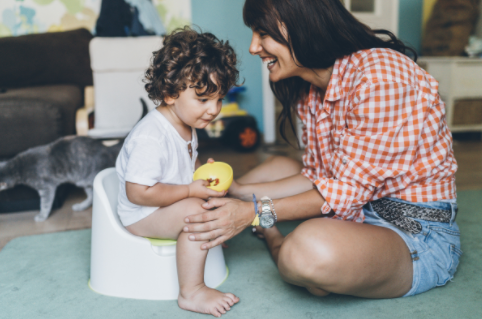9 Signs Your Child Is Ready for Potty Training

9 Signs Your Child Is Ready for Potty Training – A Pediatric Pelvic Health Physical Therapist’s Perspective
Potty Training can be a stressful, yet exciting experience for both the child and the caregiver. It is a period of time where your child is exploring a new level of independence! But, how do you know that your child (and your family) is ready to start Potty Training?
Amanda DiGangi from Chicago Pediatric Therapy & Wellness Center is a board-certified in pediatric physical therapist trained in pediatric pelvic health and she is here to help! She’s put together 9 signs that your child is ready for toilet training to help you and your family decide if it is time to embark on this Potty Training journey.
With her background in pediatric pelvic health physical therapy, she provides a unique approach to this topic to encourage healthy toileting from an early age.
Here are the NINE benchmarks you may want to consider before attempting to start Potty Training your child:
 18 months of age or older
18 months of age or older
- – Quite honestly, you may want to wait until your child is closer to 22 months to even consider it. The very earliest the nervous system is ready for traditional Potty Training is 18 months, but this is for a select, few children, and quite the minority.
-
- – This means that some children are physically capable of making the decision of when to go and when to hold. More commonly, children are ready to toilet train between 22 and 30 months of age.
 Aware of when they’re going to the bathroom
Aware of when they’re going to the bathroom
- – Is your child pressing on their belly when they go? Are they adopting a characteristic potty position such as crouching down or hiding behind the couch?
- – Your child’s awareness of when they are going is a very important sign of readiness for potty training.
 Dry diaper for 2 hours at a time
Dry diaper for 2 hours at a time
- – This is important because it indicates that your child’s bladder capacity is increasing.
- – This means that your child’s nervous system is maturing and is getting ready to have greater toileting success!
 Dry diaper after naptime
Dry diaper after naptime
- – Another sign that your child is ready is when they make it through naptime without a wet diaper. The ability to decrease the flow of urine while resting is yet another indication that your child’s nervous system is maturing.
- – This means that child’s body is physically ready to embark on this journey.
 No longer having bowel movements at night
No longer having bowel movements at night
- – This is a real big-kid transition that, you guessed it, indicates nervous system maturity.
- – It demonstrates that your child is one step closer to having potty training success.
 Regular or predictable bowel movements
Regular or predictable bowel movements
- – Having regular bowel movements is helpful in potty training as it can simply make toileting success much easier during the training process.
- – It also indicates that your child’s sleep patterns, diet, fluid intake, and physical activity may be adequate for potty training, as regular bowel movements often rely on regularity of such systems.
 Ability to play in a deep squat position
Ability to play in a deep squat position
- – Playing in deep squat is a great skill to achieve prior to potty training. This skill improves your child’s hip and pelvic mobility to make for smoother passing of both urine and bowel movements.
- – Prolonged play in this position is helpful for elongating the pelvic floor muscles and encouraging movement of stool along the bowel.
- – It also provides feedback to your child when their bladder is full. Another important aspect of this skill is your child’s ability to maintain postural control and coordination of the muscles in the pelvic area.
- – Each of these skills will improve your child’s ability to successfully sit on the potty with good control, coordinate their pelvic floor, and achieve adequate hip/pelvic position to allow urine and stool to empty.
 Ability to help with the process such as pulling pants down
Ability to help with the process such as pulling pants down
- – It is always important to involve your child in the toilet training process. This can look very different from child to child. Encourage your child to actively participate in the process as they are able.
- – For example, pulling their own pants down, turning on the light, putting on the training potty seat, or flushing the toilet afterwards.
- – Engaging your child in the process and rewarding them each step of the way is likely to progress their independence and success!
- – If your child is not typically developing, you should still involve them in the process! Just like their peers, the end goal is to have your child be as independent with the toileting process as possible.
- – Involve your child in ways you feel they can be successful to promote independence. Be sure to provide them with plenty of positive encouragement and praise for all successes in the bathroom, not just for urinating or having a bowel movement.
 Emotional readiness of the child and caregiver
Emotional readiness of the child and caregiver
- – A huge aspect of toileting success is not only the emotional readiness of the child, but also the readiness of the caregiver. Some families commit to spending four straight days working on potty training. Other families simply cannot devote that much time continuously to potty training.
- – Whenever you’re ready, be sure that everyone on your team is also ready! This includes your partner, but may also include a caregiver, preschool teacher, or relative that is assisting with childcare.

Ready To Get Potty Training Started?
Convinced your child is ready? Awesome, we can’t wait to hear about your successes on our social media! Still nervous to get started? That is okay too! As mentioned, success relies on a team approach and readiness from all caregivers. If work is busy, your child’s schedule is atypical that weekend, or you plain need a break, just wait.
Find a time that works best for you and your family. If you’ve read these 9 signs and would like more information, check out our blog – Putting The PT in Potty Training or check us out on our Facebook and Instagram page
If you feel your child is still not physically ready to potty train but would like some direct guidance to get started, please contact our office at 773-687-9241 to schedule a pediatric pelvic health physical therapy evaluation at Chicago Pediatric Therapy & Wellness Center.



 18 months of age or older
18 months of age or older Aware of when they’re going to the bathroom
Aware of when they’re going to the bathroom Dry diaper for 2 hours at a time
Dry diaper for 2 hours at a time Dry diaper after naptime
Dry diaper after naptime  No longer having bowel movements at night
No longer having bowel movements at night Regular or predictable bowel movements
Regular or predictable bowel movements Ability to play in a deep squat position
Ability to play in a deep squat position Ability to help with the process such as pulling pants down
Ability to help with the process such as pulling pants down Emotional readiness of the child and caregiver
Emotional readiness of the child and caregiver